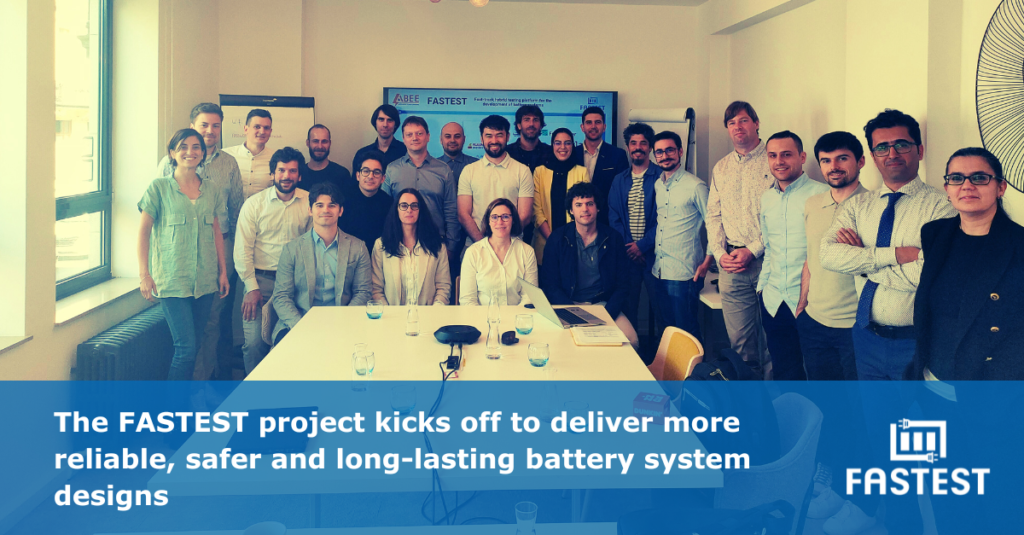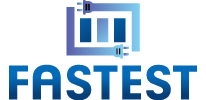
-
FASTEST is a project financed with almost 5 million euros by the European Union within the framework of the research and innovation programme Horizon Europe with the aim of developing a fast-track hybrid testing platform for the development of battery systems.
-
The initiative is supported by a multidisciplinary consortium of 14 partners comprising research centres, universities, consultancy companies, material suppliers, and cell manufacturers from 8 European countries.
FASTEST, an initiative funded by the European Union within the framework of the research and innovation programme Horizon Europe with the aim of developing a fast-track hybrid testing platform for the development of battery systems has just kicked off with a meeting held in Brussels (Belgium).
To develop and market Lithium-ion batteries, manufacturers need to evaluate their safety, performance, reliability, and lifetime according to standardised methods that consume a remarkable amount of time and economic resources. The time or number of tests required, the expensive equipment and a generalised trial-error approach are determining factors, together with a lack of understanding of the complex multiscale and multi-physics phenomena in the battery system. Besides, testing facilities are operated locally, meaning that data management is handled directly in the facility, and that experimentation is done on one test bench. When several technology developers are involved, the lack of centralised data management and harmonised design of experiments only hampers the process.
In this context, the FASTEST project, made up of fourteen partners from eight different European countries, will work for thirty-six months on a strategy based on the development of a fast-track hybrid testing platform that capitalizes on a smart Design of Experiments methodology for the accurate and reliable evaluation of cell, module, and battery pack parameters by combining physical experimentation and multi-scale and multi-physics modelling tools. This will enable an accelerated battery system research and development process for more reliable, safer, and long-lasting battery system designs. Hence, providing a key competitive advantage to European cell and battery manufacturers to provide quickly and efficiently the requested quality product for original equipment manufacturers in the international markets.
This innovative platform and its components will be demonstrated for three representative use cases: automotive, stationary, and off-road vehicles. The tool is aimed to be a flexible platform for any chemistry and application in the three previous scenarios mentioned since it will incorporate a complete set of physic-based and data-driven models able to replace most physical characterisation experiments.
The FASTEST project is expected to reduce the overall time and cost of battery production by at least 20 – 30 % as well as to decrease the number of physical experiments, which will have a direct consequence in the reduction of material costs and the efficient distribution of resources.
This pioneering concept will improve the competitiveness of the European battery industry across the value chain by cutting the time and investment required for the development of new advanced cell design and manufacturing processes since the firm’s (any cell-to-battery manufacturer) increased resources can be better allocated to increase the innovation capacity.
Europe as a future leader in the battery global market
Pushed by climate change policies, the increasing scarcity and price of fossil fuels, and the need to meet with the global clean energy demand, the market and applications for lithium-ion batteries has been rising over the past years, supported by a performance improvement and a reduction of production costs. Right now, the market is entering a period in which current generation Lithium-ion cells are evolving and, eventually, they will finally get to solid state fourth generation cells that are closer to reach the fundamental limits of this energy storage.
The emerging European battery sector, which aims to cover the whole value chain, has ambitions to lead the global market based on knowledge and innovation. For this vision to be achieved, European organisations need to be able to design and mass-produce better batteries thanks to the use of advanced materials, innovative cell and battery pack designs, cutting-edge battery, and thermal management systems. Thus, to lead the market being able to generate top-class batteries which are affordable, these should be reliable, safe, and of greater performance.
About FASTEST
Led by ABEE, FASTEST is made up of BMZ Germany, COMAU, FEV, Flash Battery, Flanders Make, Fraunhofer Gesellschaft, IKERLAN, INEGI, Mondragon Unibertsitatea, Surrey University, Sustainable Innovations, University of Ljubljana, and VTT.
The project has received €4,781,008 in funding from the European Union’s Horizon Europe research and innovation program under grant agreement number 101103755.
